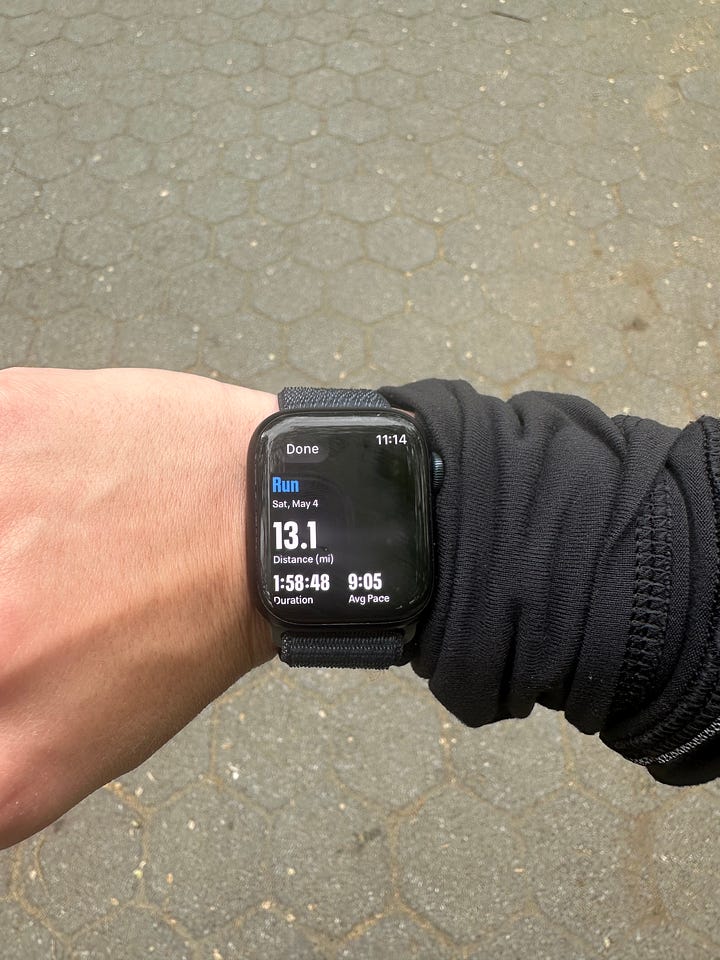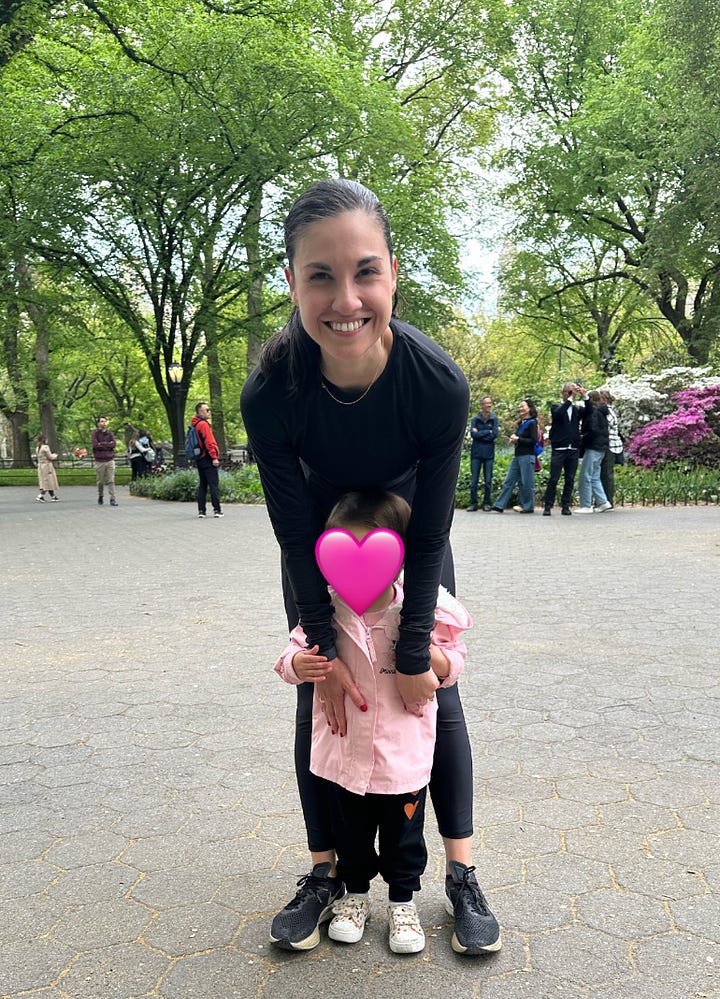The Profile: The founder who lost $36 billion in one week & the professor protesting Columbia’s students
An update on my ill-fated half marathon…
Good morning, friends!
If you’ve been with me and this newsletter for some time, you know that I don’t normally share a goal before I hit it. (Like how I didn’t publicly tell anyone that I was writing a book until it was available for pre-order.)
I’ve never liked sharing an intention before the result. I’m not entirely sure why — probably because I’m afraid that I won’t complete it or that it’ll get derailed in some way.
Well. This leads me to what happened last weekend.
A little backstory: After my son was born in November, I needed a new goal to chase. I decided that half marathon training would be a great mental/physical outlet following postpartum. Plus, I found a race on April 28, which seemed like the perfect, far-away date.
So I started training in January. I shared updates about it in this newsletter and on Twitter, and Instagram. For the first time, I publicly stated my intention to run a sub-2 hour half, and I thought that would give me the accountability I needed to take the training seriously.
And I did. I ran mile after mile during the week and dutifully completed my long runs every Sunday morning.
On the evening before the race, I laid out my clothes for the following day and studied the course map one last time.
And then, of course — of course — I started feeling severely nauseous and deeply unwell. I’ll spare you the details, but my husband and I got food poisoning.
So at 4 a.m — four hours before the half was set to begin — I was Googling, “Can you run a half marathon with food poisoning?” (The answer is: you can try, but there’s a serious chance you might get dangerously dehydrated & end up in the hospital.) Given that I couldn’t even keep a sip of water down, I decided it wasn’t worth the risk.
Needless to say, I wasn’t able to run it. I gotta admit — it was a weird cocktail of feelings. Even though food poisoning wasn’t exactly on my bingo card, I felt really disappointed that I couldn’t close the chapter on this journey.
So then what? I kept thinking about this one part from Casey Neistat’s video Sisyphus and the Impossible Dream. In it, he talks about how he attempted to complete the New York City marathon under three hours last year, and his time came in at …. 3 hours and 1 minute. Devastating.
He says:
“It’s just an arbitrary number. I don’t need to break three hours to know who I am. What matters are the experiences. The journey. Even if I failed in the goal, see, life’s a battle, and there are times when you need to accept that you’ve been beat. ”It’s been a long road, and there’s a lot to be proud of. But I’m never going to break three. I’m just not that guy.
[he pauses, and then says:]
“Oh, F*CK THAT.”
Of course he didn’t stop. Of course he didn’t give up after that attempt. It took him 17 years and 24 marathons, but finally, at age 42, Neistat ran a 2 hour and 57 minute marathon.
Here’s the thing: I know that running this half doesn’t define me, but I am also determined to finish what I start.
So yesterday, May 4, without telling anyone, I went to Central Park and ran the exact route of the half marathon — two loops around the park for a total of 13.1 miles.
(And I managed to achieve my goal/personal best of sub-2 hours, running 1:58:48 with an average pace of 9:05 minutes/mile.)


No cheering. No fanfare. No medal. Just me and my family at the “finish line.”
I didn’t have to run it. It may seem meaningless, purposeless, and stupid, but it was important to me. As Neistat said:
“You do a lot of meaningless, purposeless, stupid things. You get obsessed. You spend years focused on it. And literally, no one cares but you. But you persevere anyway and you keep running. Because when you add up all those stupid, meaningless obsessions, what they add up to is your life.”
Thank you all for being so supportive along the way, and I am eternally grateful for the kind messages you sent my way. Have a wonderful week ahead!
— Polina
—
ATTN NYC FOUNDERS: I often joke that I would’ve been a damn good VC if I hadn’t become a journalist. So to test this, I’m doing something fun. If you’re a founder in NYC, come pitch your startup in 1 minute and get unfiltered feedback from me and and my husband Anthony . It’s an in-person event that will be recorded and live-streamed. Want to attend? Want to watch? Want to pitch? Details here.
PROFILES.
— The founder who lost $36 billion in one week [**HIGHLY RECOMMEND**]
— The professor protesting Columbia’s own students
— The tennis star playing for herself
— America’s beleaguered radio network
— OpenAI’s ‘underdog’ competitor
PEOPLE TO KNOW.
The founder who lost $36 billion in one week: In near total secrecy, Archegos Capital Management founder Bill Hwang amassed a fortune that briefly eclipsed $36 billion, only to see it wiped out very publicly. In the end, the Archegos flameout inflicted billions of dollars in losses at banks that did business with him—even hastening the death of Credit Suisse. Now, he’s fighting to avoid prison. (Bloomberg; try this link you can’t access the article)
“This is one of the biggest market-manipulation cases ever charged. The big question now is will this guy go to jail for it?”
The professor protesting Columbia’s own students: Shai Davidai has been battling the Columbia administration for months — a fight he has extended far beyond campus. The Israeli-born assistant professor at the business school has demanded since October 7 that Columbia crack down on pro-Palestinian protesters whom he accuses of calling for violence against Jewish students on campus. Here’s how Davidai, a self-described “lefty Israeli,” made himself the face of the campus-protest backlash. (The New York Times; try this link if you can’t access the article)
“You might not know this from everything roiling around him, but I know him as a peacenik. He is a firm believer in a two-state solution.”
The tennis star playing for herself: In September, Coco Gauff became the first American teenager to win the U.S. Open in nearly a quarter-century. She struggled to meet early expectations on the court, fighting self-imposed pressures for years, but she finally eased her mind a bit last summer, thrilling the crowd in New York City as she nabbed her first Grand Slam win at the U.S. Open. Gauff earned nearly $23 million in winnings and endorsements in 2023, making her the highest-paid female athlete in the world. Gauff has made a conscious effort to adjust her mindset, ensuring she doesn’t tie her identity to tennis too much. “It is much easier to play for yourself than it is for other people,” she says. (TIME)
“She’s focused. She’s fearless. We need some leaders in the women’s game. She definitely will be one of them. If not the one.”
COMPANIES TO WATCH.
America’s beleaguered radio network: Oh, NPR. For the past two weeks, turmoil has engulfed NPR after a senior editor assailed what he described as an extreme liberal bias inside the organization that has bled into its news coverage. The editor, Uri Berliner, said NPR’s leaders had placed race and identity as “paramount in nearly every aspect of the workplace” — at the expense of diverse political viewpoints, and at the risk of losing its audience. But NPR’s troubles extend far beyond concerns about its journalism. Internal documents reviewed by The New York Times and interviews with more than two dozen current and former public radio executives show how profoundly the nonprofit is struggling to succeed in the fast-changing media industry. It is grappling with a declining audience and falling revenue — and internal conflict about how to fix it. (The New York Times)
“We are slipping in our ability to impact America, not just in broadcast, but also in the growing world of on-demand audio.
OpenAI’s ‘underdog’ competitor: Cohere, the Toronto-based startup is among OpenAI’s top competitors in the race to build the most capable large language models (LLMs). Cohere, along with Big Tech behemoths like Google and Meta, as well as other startups like Anthropic and Mistral, are all chasing OpenAI in the frenzied competition for AI dominance that began with the release of ChatGPT in November 2022. Meet the ‘underdog’ that could soon be worth $5 billion by doing the opposite of OpenAI’s every move. (FORTUNE; try this link if you can’t access the article)
“I love feedback. It’s what makes our products better. So we want to build great, useful technology and criticism is a core piece of that.”
✨ The rest of this newsletter is only available for premium members of The Profile, whose support makes this work possible. If you’re not already a premium member, consider upgrading your subscription below for access to an additional section of weekly audio + video recommendations. ✨
Keep reading with a 7-day free trial
Subscribe to The Profile to keep reading this post and get 7 days of free access to the full post archives.


